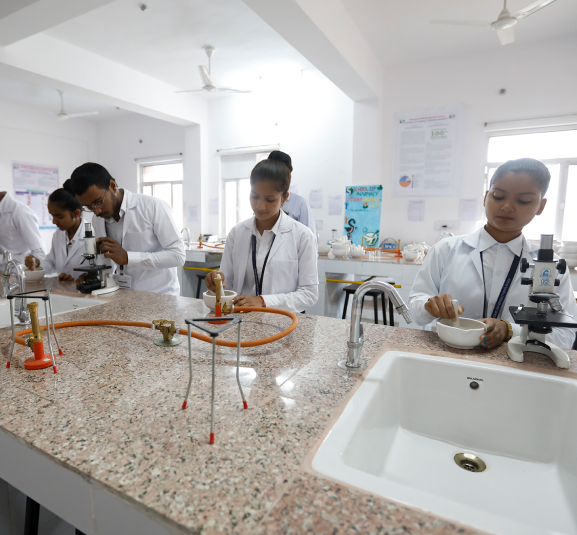School of Pharmacy at Sangam University is approved by the Pharmacy Council of India (PCI). We started this program in 2019, offering state of the art infrastructure and well reputed faculty, while following all norms of regulatory body. The institute offers a degree course and a diploma course in pharmacy. A Bachelor of Pharmacy (abbreviated as B. Pharma) is an undergraduate academic degree and it is a four-yearprogram. Whereas Diploma in Pharmacy (abbreviated as D. Pharma) is a two-year program. The diploma is the basic prerequisite for registration to practice as a pharmacist in India.
Students those are interested in the medical field (except to become a doctor) can choose this course after the completion of class 12th (PCM/B). After the completion of this degree, students can practice as a Pharmacist. Pharmacists can work in a range of industries related to the prescription, manufacture & provision of medicines.
When the profession of pharmacy was developed in the country way back in 1960s, there was a demand for the qualified pharmacists, in order to cater to the needs of the then profession of pharmacy, a short version of pharmacy program, namely Diploma in Pharmacy (D. Pharm) was developed and offered to the students with SSLC /10th qualification. Later, in 1990s, the minimum qualification for D. Pharm admission was raised to 10+2. Thus, a large number of students persuaded their interest in the profession of pharmacy through D. Pharm and registered themselves as pharmacists. Our Sangam School of Pharmacy is one of the best collegesto obtain adegree or diploma in pharmacy. Enquire today with our admissions officers to know more!
We have
2,000+ Recruiters
Ready to Provide You with the Best
Job Offers With upto
Highest Package
30 Lakhs
average packages of
8 LPA

Industry Collaborations
1000+
For Up Skilling
Industry Collaborations
1000+
For Up Skilling
Programme Objective
The objective of a School of Pharmacy is to provide students with the knowledge, skills, and values necessary to become competent and compassionate pharmacists who can contribute to the health and well-being of their patients and communities. This involves educating students in the scientific and clinical aspects of pharmacy, as well as in the ethical, legal, and social issues surrounding the profession.
Specifically, a School of Pharmacy aims to:
- Provide a rigorous academic program that covers the basic sciences, pharmaceutical sciences, and clinical pharmacy, with a focus on evidence-based practice.
- Foster critical thinking, problem-solving, and communication skills, as well as the ability to work effectively in a team-based environment.
- Emphasize the importance of professionalism, ethics, and social responsibility in the practice of pharmacy.
- Provide experiential learning opportunities that allow students to apply their knowledge and skills in real-world settings, such as hospitals, clinics, and community pharmacies.
- Engage in research and scholarship that advances the science and practice of pharmacy, and that contributes to the development of new drugs, therapies, and technologies.
- Collaborate with other health care professionals to improve patient care and promote interdisciplinary education and practice.




